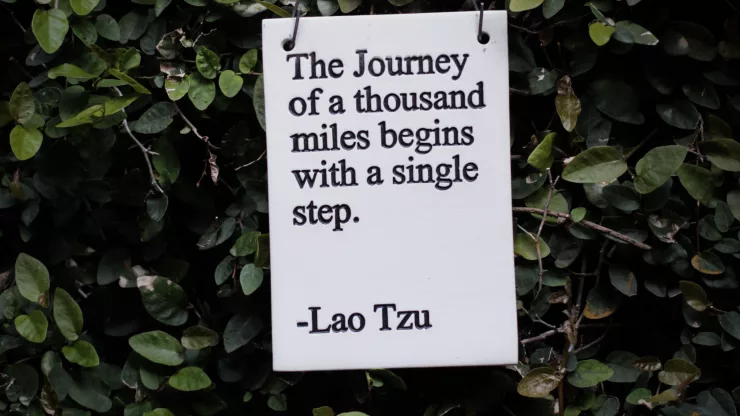Embracing Life Transitions: A Guide to Thriving
Life is full of transitions, from graduating college to starting a new job, getting married, having children, and eventually retiring.
These changes often bring excitement, joy, and new opportunities, but they can also be stressful, overwhelming, and challenging.
However, with the right mindset and strategies, you can learn to embrace life transitions and thrive, rather than just survive.
In this article, we will explore the nature of life transitions, their benefits, coping strategies, resilience, and the key to thriving in life.
Jump to Section
Understanding the Nature of Life Transitions
Life transitions are inevitable and occur throughout our lives, whether we want them or not.
They can be planned or unexpected, positive or negative, and can affect various aspects of our lives, such as our identity, relationships, health, career, and finances.
Some common life transitions include:
- Childhood to adolescence
- Adolescence to adulthood
- Singlehood to marriage
- Marriage to parenthood
- Parenthood to an empty nest
- Employment to retirement
- Health challenges or disabilities
- Loss of a loved one
Each transition has its unique challenges, opportunities, and emotions. However, they all share some common characteristics, such as uncertainty, ambiguity, and a sense of loss or gain.
Understanding the nature of life transitions can help you prepare for them, manage your expectations, and cope with the changes.
The Benefits of Embracing Life Transitions
While life transitions can be challenging, they also offer many benefits, such as:
- Personal growth: Life transitions can push you out of your comfort zone, challenge your beliefs, and help you discover new strengths and skills. They can also help you learn from your mistakes, reflect on your values, and set new goals.
- Increased resilience: Going through difficult transitions can make you more resilient and adaptable, as you learn to cope with uncertainty, change, and setbacks. Resilience can help you bounce back from challenges, maintain your well-being, and thrive in the face of adversity.
- New opportunities: Life transitions can open up new doors, relationships, and experiences that you may not have otherwise pursued. They can also help you broaden your perspective, try new things, and explore your passions.
Strategies for Coping with Life Transitions
Coping with life transitions requires a combination of self-awareness, self-care, and support. Here are some strategies that can help you navigate life transitions:
- Acknowledge your feelings: It’s okay to feel a range of emotions during life transitions, such as sadness, fear, excitement, or anxiety. Acknowledging your feelings can help you process them and move forward.
- Practice self-care: Taking care of your physical, emotional, and mental health is crucial during life transitions. This can include getting enough sleep, eating well, exercising, meditating, or seeking therapy.
- Seek support: Talking to trusted friends, family, or professionals can provide you with the emotional support and guidance you need during life transitions. Joining support groups or seeking mentorship can also help you connect with others who have gone through similar experiences.
- Focus on what you can control: While some aspects of life transitions may be out of your control, focusing on what you can control, such as your attitude, actions, and goals, can help you feel empowered and motivated.
How to Find Your Resilience During Life Transitions
Resilience is the ability to adapt, bounce back, and grow from challenges. Here are some ways to find your resilience during life transitions:
- Cultivate a growth mindset: Embrace challenges as opportunities to learn and grow, rather than as failures or setbacks. Focus on your strengths and skills, and believe in your ability to overcome obstacles.
- Practice self-compassion: Treat yourself with kindness, patience, and understanding during life transitions. Don’t judge yourself harshly or compare yourself to others. Instead, be gentle and supportive of yourself, as you would with a friend.
- Build a support network: Surround yourself with people who uplift, inspire, and support you during life transitions. Seek out mentors, coaches, or therapists who can help you navigate challenges and provide you with feedback and guidance.
- Take action: Rather than feeling stuck or helpless during life transitions, take proactive steps towards your goals. Break down your goals into small, achievable steps, and celebrate your progress along the way.
Embracing Change: The Key to Thriving in Life
Embracing change is the key to thriving in life transitions. Here are some ways to embrace change:
- Focus on the positive: Instead of dwelling on the negative aspects of life transitions, focus on the opportunities and possibilities that they bring. Look for silver linings, learn from your mistakes, and appreciate the present moment.
- Practice gratitude: Gratitude can help you cultivate a positive mindset and appreciate the good things in your life, even during challenging times. Make a habit of writing down three things you’re grateful for each day.
- Embrace uncertainty: Life transitions can be unpredictable, but that doesn’t mean they have to be scary. Embrace the uncertainty and see it as an adventure, rather than a threat. Trust that you have the resilience and resources to handle whatever comes your way.
- Stay flexible: Life transitions may require you to adjust your plans, expectations, or goals. Stay flexible and open-minded, and be willing to pivot if necessary. Remember that change is not always linear, and that setbacks and detours can lead to new opportunities.
FAQ
How can I prepare for life transitions?
Preparing for life transitions involves a combination of self-reflection, planning, and support. Some ways to prepare for life transitions include:
- Reflect on your values, goals, and priorities, and identify areas of your life that may be affected by the transition.
- Research and gather information about the transition, such as the steps involved, the resources available, and the potential challenges and opportunities.
- Seek out support from trusted friends, family, or professionals who can provide you with guidance and advice.
- Practice self-care and build resilience, so that you’re better equipped to handle the transition when it comes.
What if I’m struggling to cope with a life transition?
If you’re struggling to cope with a life transition, it’s important to seek out support and resources that can help you. This can include:
- Talking to a trusted friend, family member, or professional therapist who can provide you with emotional support and guidance.
- Joining a support group or community of people who have gone through similar experiences.
- Seeking out resources, such as books, articles, or online courses, that can provide you with practical strategies for coping with the transition.
- Practicing self-care and building resilience, so that you’re better equipped to handle the challenges of the transition.
How long does it take to adjust to a life transition?
The time it takes to adjust to a life transition varies from person to person and depends on various factors, such as the nature of the transition, your personality, and your support network.
Some transitions may take only a few weeks or months to adjust to, while others may take years.
It’s important to be patient with yourself and to seek out support and resources that can help you navigate the transition at your own pace.

With a deep passion for personal development, Ben has dedicated his career to inspiring and guiding others on their journey towards self-improvement.
His love for learning and sharing knowledge about personal growth strategies, mindfulness, and goal-setting principles has led him to create My Virtual Life Coach.
Contact Ben at [email protected] for assistance.




